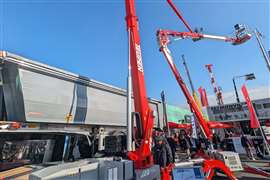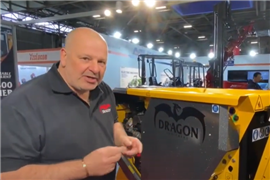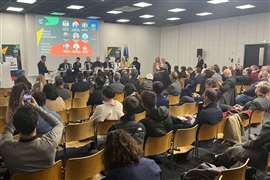Spanish realism
22 October 2013

With Spain’s SMOPyC show scheduled for spring next year, the organisers are calling on companies to concentrate on three areas to cope with the economic crisis in the country – internationalisation, innovation and diversification.
José Antonio Vicente, director of the Zaragoza Exhibition Centre where SMOPyC will be held, said, “I think we have to be optimistic, yet realistic and proactive. An economic recovery is now being discussed in many arenas, but the building industry doesn't have the same outlook. In fact, the latest forecasts by Euroconstruct for construction in our country suggest no signs of movement until 2015.
“However, it is also true that until then decline will be more gradual and not as sharp, although the numbers are still in the red.”
It will be the 16th SMOPyC – the International Show of Public Works, Construction & Mining Machinery – and it will run from 1 to 5 April, 2014, at the Zaragoza Exhibition Centre.
Vicente said, “In all these years of crisis, a lot of firms have repositioned, downsized and looked outside of Spain. Now, more than ever, firms need to participate in trade shows to reap the benefits. In 2011, in the thick of the crisis, 1,253 exhibitors took part and 89,000 visitors came. So we are hoping to repeat that at least.”
He said that some experts believed that the sector had already hit rock bottom and that the market in new machinery sales could not fall much further.
“So by late 2013,” he said, “there might be a shift in this trend.”
He added, however, that another widespread opinion was that this crisis would serve to harness and boost productivity, with greater specialisation in machinery and a search for lower fuel consumption.
'Expertise'
He said that with SMOPyC about to turn 40, the expertise and results across this period of time were its greatest credentials. Also, the fact that it has an organising committee made up of 22 firms, 19 organisations and national or international associations, was another of its strengths.
“The Spanish construction machinery industry has a solid reputation in international markets and is highly appreciated by users,” said Vicente. “Traditionally, depending on the subsector, it is usual to find Spanish manufacturers with significant market shares.
“Logically, the crisis has affected exports, but there is a growing presence of Spanish machinery in markets like the Middle East, the US and Asia.”
He went on, “The Spanish offer is based on high-tech machinery that is good value and more competitively priced than the German, Japanese and American machinery that has historically dominated the sector.”
He also claimed that in terms of health and safety, as well as environmental aspects, Spanish machinery was of “a very high quality as it abides by European legislation in these areas, which is a lot more advanced than in most other countries”.
Strategies
The strategies that firms should pursue at such a critical time centred on three basic tools, according to Vicente. These are internationalisation, innovation and diversification.
“As is tirelessly repeated, internationalisation is not an option – it is an obligation for the survival of companies. Companies need to have versatile structures to adapt to markets and overcome the hurdles thrown up in internationalisation processes, such as dealing with the peculiarities of destination countries, including the various pieces of legislation that they need to be aware of.
“For this reason, innovation is just as important – not just in terms of the product itself but within the actual organisation The company needs to be open to new processes, partnerships with other firms, etc.”
When it came to diversification, he said companies could and should look at other sectors that could be candidates for the use of machinery that had traditionally been used for construction, and which present greater dynamism and potential for growth. These could include areas such as materials handling, recycling, scrap, landfill management, and the farming and forestry industries.
“Internationalisation is an ongoing activity at SMOPyC,” he said. “It is at its very core. In the challenge of internationalisation and the opening of new markets, SMOPYC could be a huge help for firms, establishing synergies, facilitating contacts and enhancing services to attract international visitors.”
Vicente added, “We have been working, and we continue to do so, to achieve a competitive show, with rates adjusted to the situation the market is experiencing, driving down participation costs, without compromising on the quality of facilities and services.”






